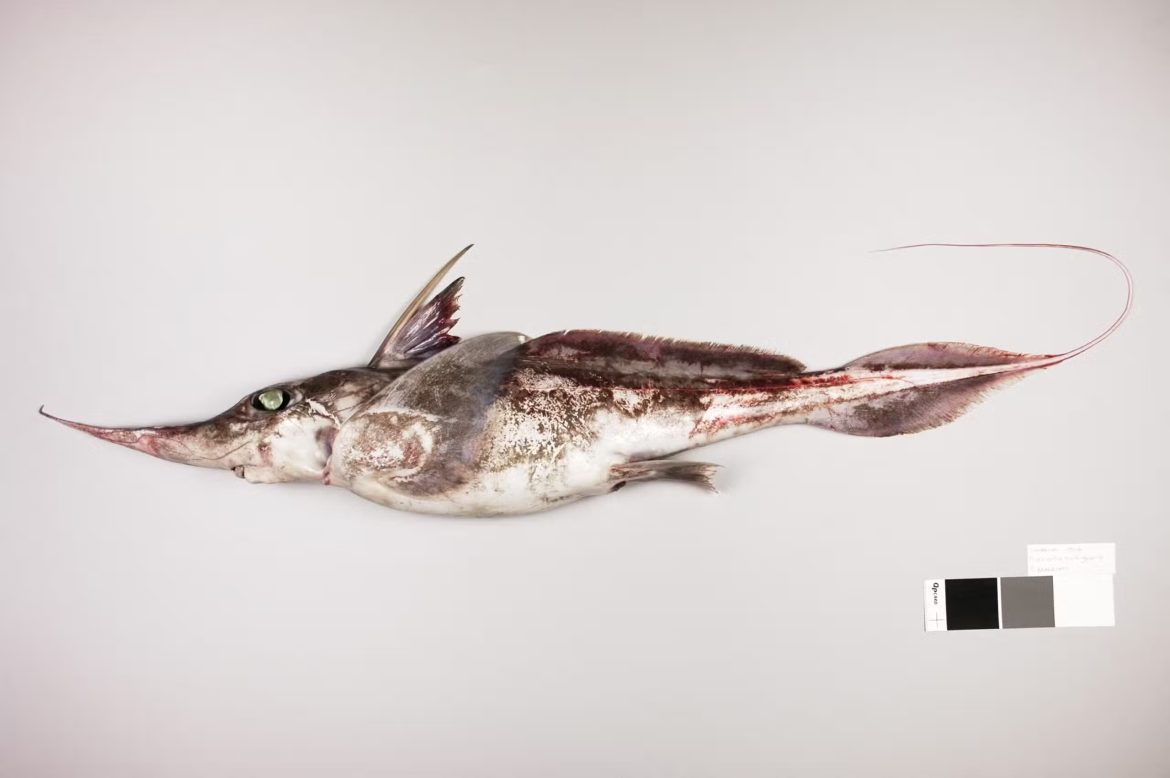A new species of ghost shark, known as the Australasian Narrow-nosed Spookfish, has been discovered in the deep waters of New Zealand and Australia. The discovery was announced by scientists from the National Institute of Water and Atmospheric Research (NIWA) based in Wellington, New Zealand.
The Australasian Narrow-nosed Spookfish, scientifically named Harriotta avia, was found during research on the Chatham Rise. The Chatham Rise is a significant underwater plateau that stretches approximately 1,000 kilometers east of New Zealand. The research team included marine biologists and ichthyologists who were conducting a study on deep-sea biodiversity in the region.
The new species of ghost shark was identified due to its unique physical characteristics. Harriotta avia has an elongated, narrow, and depressed snout, which makes up nearly 56% of its head length. The species also features a long, slender trunk, large eyes, and very long, broad pectoral fins. These physical traits distinguish it from other members of the ghost shark family.
Prior to this discovery, the Australasian Narrow-nosed Spookfish was believed to be part of a single globally distributed species. However, recent research and genetic analysis confirmed it as a distinct species. The discovery has generated excitement in the scientific community, as it provides new insights into the biodiversity of the deep-sea environment in the Pacific Ocean.
Dr. Brit Finucci, a marine biologist at NIWA, played a key role in the discovery. During a press conference, Dr. Finucci explained the significance of the find. “The Australasian Narrow-nosed Spookfish is a remarkable example of deep-sea adaptation. Its unique physical characteristics and genetic makeup set it apart from other species in its family. This discovery underscores the importance of exploring and understanding the deep-sea ecosystems.”
The discovery process involved multiple stages, including the collection of specimens, detailed morphological examinations, and genetic sequencing. The research team conducted deep-sea trawling operations to collect specimens from depths exceeding 1,500 meters. These specimens were then analyzed in the laboratory, where the team conducted detailed measurements and genetic tests to confirm the new species.
The Australasian Narrow-nosed Spookfish is not only significant for its unique characteristics but also for its role in the deep-sea ecosystem. Ghost sharks, also known as chimaeras, are ancient relatives of sharks and rays. They are known for their cartilaginous skeletons and distinctive features. The discovery of a new species adds to the understanding of the evolutionary history and ecological role of these deep-sea creatures.
The Chatham Rise, where the new species was discovered, is a region known for its rich biodiversity. It is home to numerous species of fish, invertebrates, and other marine organisms. The discovery of the Australasian Narrow-nosed Spookfish highlights the importance of ongoing research and conservation efforts in this area.
The findings of the research team have been published in a scientific journal, providing detailed descriptions and illustrations of the new species. The publication has sparked interest among marine biologists and researchers worldwide. It also emphasizes the need for further exploration of deep-sea environments to uncover more hidden species and understand their ecological significance.

